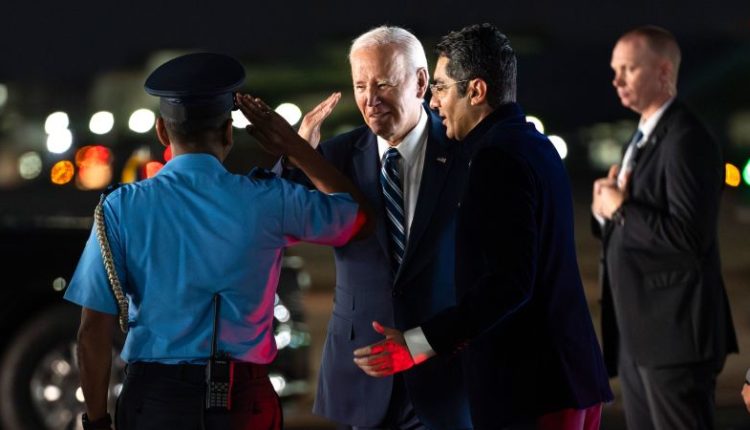With Xi and Putin absent from G20, Biden presses support for Ukraine and an overseas investment plan to counter China
President Biden was hoping to convince the world’s largest economies to rally behind Ukraine during Saturday’s Group of 20 summit in India while also pressing his case for American investment in the developing world.
The absence of his two chief global rivals — Chinese leader Xi Jinping and Russian President Vladimir Putin — provides opportunities for Biden to make a more affirmative case at the summit, White House officials said as the gathering was getting underway in New Delhi.
He was expected to announce new plans with partner nations in Europe, the Middle East and Asia to construct a transit corridor connecting the regions, a major challenge to China’s own efforts at expanding global trade.
And he was unveiling new reforms and investments in the World Bank, which the White House says could unlock hundreds of billions of dollars in grants and loans for the developing world.
Still, the divisions within the grouping were apparent as the gathering was getting underway.
Diplomats were still working to draft a final joint statement from the leaders, hitting snags when coming up with language about Russia’s invasion of Ukraine. Russia, as a member of the G20, would have to agree on any consensus statement.
And it remained unlikely that leaders would agree to any major new steps to combat climate change, even as global temperatures — including in the host city New Delhi — soar.
“India calls upon the world to come together to transform the global trust deficit into one of trust and reliance. This is the time for all of us to move together,” the summit’s host, Indian Prime Minister Narendra Modi, said as the gathering got underway.
“Be it the divide between North and South, the distance between the East and West, management of food and fuel, terrorism, cyber security, health, energy or water security, we must find a solid solution to this for future generations,” he added.
It was a message of unity at a markedly fractured moment for the grouping.
While Biden has enjoyed ample success at other summits convincing fellow leaders to step up their military support for Ukraine and tighten their punishment of Russia, many nations, particularly in the Global South, haven’t been as convinced.
They view the billions of dollars in western assistance pouring into Ukraine skeptically, and have sought a more balanced relationship with Moscow.
Biden’s aides say the President welcomes the opportunity to continue making the case for Ukraine, including to audiences that aren’t necessarily on the same page.
“Part of what makes the G20 an appealing format for the United States is it gives us a chance to interact with and work with and take constructive steps with a wider range of countries, including some, frankly, that we don’t see eye to eye with on on every issue,” US deputy national security adviser Jon Finer told reporters on Saturday.
An alternative to China’s Belt and Road?
Biden hopes to use his announcements on new infrastructure and investments as demonstration of US commitment to the developing world, and a better option for partnership than China.
The plans for a new shipping corridor linking India with the Middle East and Europe could potentially transform global trade and directly challenge China’s own sprawling overseas development initiative, known as the Belt and Road, which has poured billions of dollars into infrastructure projects each year.
Biden along with the leaders of India, Saudi Arabia, the United Arab Emirates and the European Union planned to sign a memorandum of understanding laying out the new project on Saturday.
“We see this as having a high appeal to the countries involved, and also globally, because it is transparent, because it is a high standard, because it is not coercive,” Finer said.
The plans could pose a challenge to China’s Belt and Road initiative, which the US says uses coercive lending practices for infrastructure projects in developing countries. Biden’s proposals on World Bank reform similarly aim to offer a better deal to emerging economies.
Without Xi attending, Biden will have the implicit opportunity to demonstrate sustained American commitment while questioning China’s. American officials said Saturday it wasn’t clear to them why Xi decided to skip the G20 for the first time.
“I’m not sure we have a clear answer to that question, but really it’s incumbent upon the Chinese government to explain why a leader would or would not participate,” Finer said.
Read the full article here

